Response To "Is the American Dream Dead?": Watch For The Hidden Zag
Three days ago, @thecryptofiend posted "Is the American Dream Dead?". It summarized a Freakonomics podcast which discussed lowered mobility, plus a related 54-page PDF paper. @thecryptofiend related that the most important cause of lowered mobility, with "mobility" defined as "the fraction of children who earn more than their parents," is changes in income distribution. The second-most important is slowed GDP growth.
It's the kind of paper that fuels the dystopian imagination! It elicits visions of the poor huddled masses surrounding opulent islands of wealthy folks. The same kind of world portrayed by the classic silent movie Metropolis (1927).
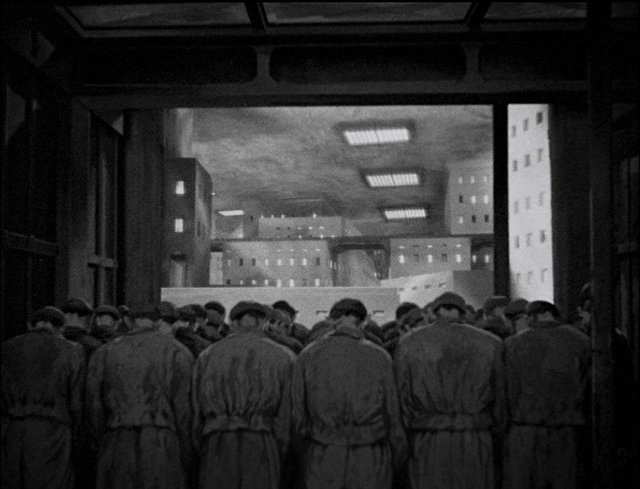

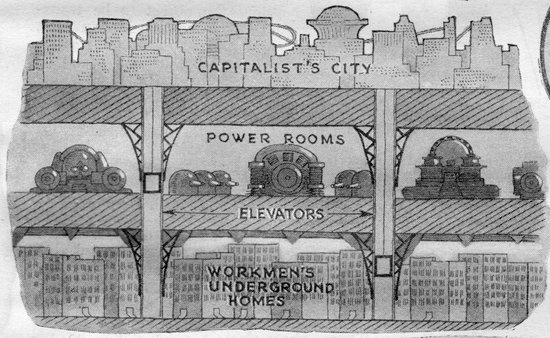
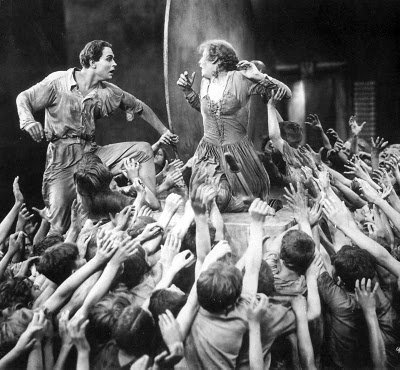
(Images from here, here, here and here.)
@thecryptofiend concludes:
Personally I think it is a bit early to say that the "American Dream" is dead. I think this is a concept that is bigger than just a single measure of mobility.
He's right on two counts. First of all, the American Dream's meaning has changed and will likely change again. Over the history of the United States, it's meant: freedom, the right to choose one's rulers, land ownership, the right to be left alone by officialdom, and something as homey as owning a farm that could be run on a subsistence basis in hard times.
Secondly, he's right to be skeptical. The modern age has been full of extrapolations of trends, both utopian and dystopian, and consequent visions that went from compelling to period pieces.
Extrapolation, 1970s Style
Thanks to the gigantic zag of the Information Age, where personal computers were followed by the Internet and smartphones, a dark futuristic vision that was compelling less than fifty years ago is now fustian. Building on the postwar world, pop-futurists and professional entertainers imagined a world where people's lives were controlled by gigantic mainframe computers. A world where corporations were bigger and more powerful than they were in the 1950s-'60s and individualism was throttled. There would be comfort, but precious little freedom.
Have a look at the opener for the 1975 classic movie Rollerball:
Sets a dystopian tone, surely.
Now take a look at the official trailer, which present the fictional world of next year (2018):
It's all there. A world where nations have gone bankrupt, leading to huge corporations becoming de facto governments; economic centralization proceeding to the point where corporations are industry-wide cartels; a world of comfort but ennui; a world separated into working class and executive class; a world where a violent sports game is a globe-spanning ritual to pacify and dull the masses - to "demonstrate the futility of individual effort."
And, a world controlled by one single huge computer called "Zero" located in Switzerland. You see its location at 1:50 and meet it at 1:54. A single computer, overlooking a comfortable but dark world.
If you're around the age of 50, the Rollerball world is the world you were expected to grow old in. You might have even been raised for a world like 1975's 2018.
But that same year, these two guys:
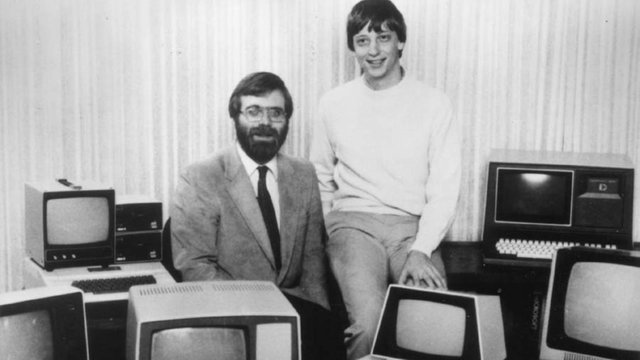
started a company called "Micro-Soft". One year later, this duo:
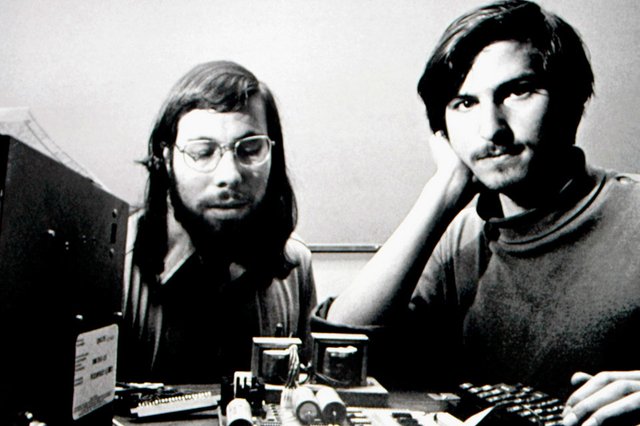
unveiled the Apple 1.
And the world zagged, into the profoundly different world we live in now. Instead of worrying about stifling conformity, we're worrying about nations splitting into echo chambers.
This zagging is normal in history. The original story that Rollerball was based on, "Roller Ball Murder" (1973), worked in the then-fashionable worry about over-population. In the 1930s, though, the fashionable worry was underpopulation. The current worry about automation obsoleting whole swathes of humans? It's actually a reprise; the same worry was widespread in the 1960s. And in the 1930s. That same George Terborgh who debunked the "Automation Hysteria" in 1966 also debunked Alvin Hanson's "economic maturity" stagnation thesis - a thesis that's been recently revived by Larry Summers.
If you're jazzed by that kind of pessimism, consider the fact that the original stagnation thesis was fashionable before the Great Expansion that Summers et. al. now yearn to bring back.
I've only dipped my foot into the pool of plausible, engaging and well-informed predictions that have gone wildly wrong.
Not one expert on the Soviet Union and the Eastern Bloc saw it collapsing at the close of the '80s. None of them saw what the collapse of the Eastern Bloc revealed: instead of keeping face with the West, the Eastern Bloc was composed of "a Third World economy with a First World military."
In the close of the 1990s, when the U.S. government reported a surplus (an arguable one), there were pie-in-the-sky articles forecasting what the financial world would be like once the U.S. Treasury had retired the entire National Debt. And of course, the business media was full of la-la-land techno-mania about Internet 1.0. It's hard to believe now, but the 2001 depicted in the movie of the same name was seen as plausible as of 1968.
And of course, we're still waiting for the flying car

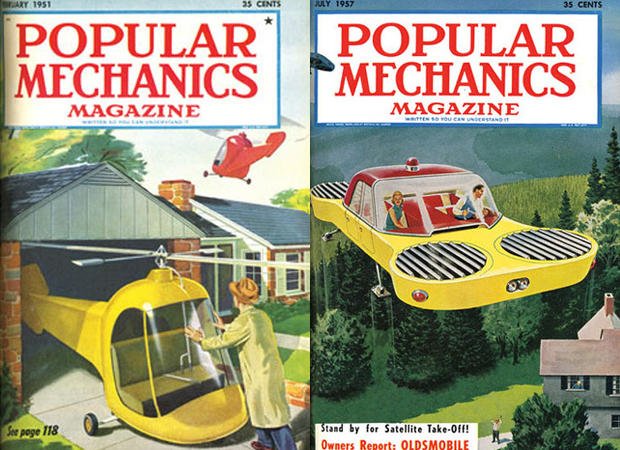
(sigh.)
The Roots Of Rising Income Inequality
If there's any lesson to take from the above, it's that compelling, plausible trends - even trends that seem well-nigh irreversible - do change direction. Even the immovable zig gives way to a zag, often by forces that are all-but invisible at the time of the reversal. It's a cynical but wise rule that says: "when a trend seems ineluctable, it's on the verge of falling apart."
It's a commonplace that the long-term trend towards greater inequality was kicked off by the Reagan Revolution, by CEOs and other business types gettin' greedy when they got a cut in marginal tax rates. Like most talking-points, this is wrong. The real source of the "Salary Revolution" (if you will) didn't get rolling in the 1980s. It started in the 1960s, and its first beneficiaries were very far from stuffy corporate executives.
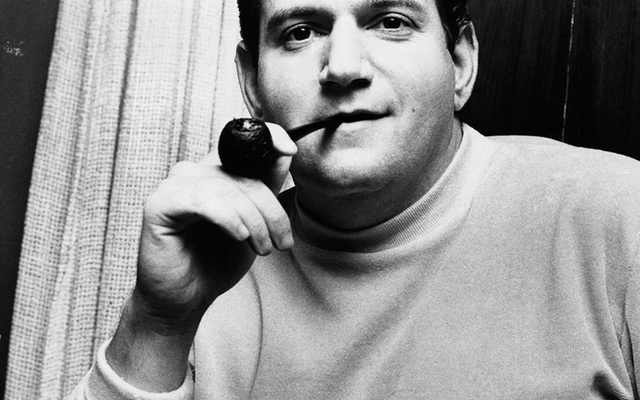
Meet Allen Klein. A New Jersey accountant, he noticed that a lot of pop and rock stars who sold a lot of records and merchandise nevertheless wound up broke. That got him into the agent business - and he was a tough one. Tough enough to make himself a lot of money and his clients too. He's the reason why:
ragged-trousered troubadours of folk rock became rich beyond dreams of avarice during the CD boom.
Case in point: the still-rolling Rolling Stones. Though Klein's first star client was Sam Cooke, the Stones were his breakthrough clients.
In the spring of 1965 Andrew Loog Oldham, co-manager of the Rolling Stones, saw in Klein a terrific business adviser and ally, one who could help him win an incipient power struggle with Eric Easton, a music business veteran who was then the other half of the band's management team.[50] Barely 21, Oldham was profoundly important in the development of the Stones' image, and in initiating the songwriting partnership of Keith Richards and Mick Jagger.[51][52] After some management mishaps, blame for which fell at Easton's feet, and Jagger's ascension in the band's hierarchy following "(I Can't Get No) Satisfaction", the Stones' first number one record in America, Oldham sought and received Jagger's blessing to bring Klein aboard for re-negotiation of the group's contract with Decca Records.[53] The label offered the band the opportunity to make $300,000 if their records continued to sell. Klein countered with, and quickly secured, an arrangement paying the Stones twice as much, in the form of an advance. He also forced London Records, Decca's American subsidiary, to sign a separate contract. It too was for $600,000. By the time Klein subsequently re-negotiated the deal one year later, Easton having been removed as co-manager, the Stones were guaranteed $2.6 million—more than the Beatles were making....
Seeing this, a Canadian fellow by the name of Alan Eagleson pulled off the same trick for professional hockey players:
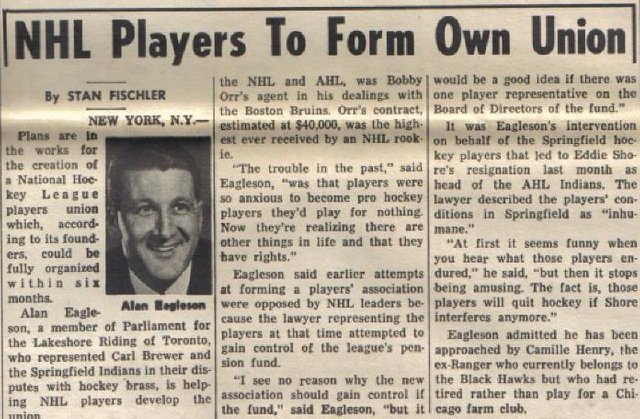
In 1967, Eagleson unveiled the NHL Players' Association. As a result, and as a result of much more TV & merch revenue flowing into professional sports, the top salary in the NHL is $14 million per year. Contrast that to the top salary of the biggest hockey star of the 1950s, Maurice "Rocket" Richard. His top was 25 thousand.
It was only a matter of time before other pro-sports leagues followed suit - not to mention Hollywood stars. After bumping into the thicket of Hollywood accounting, the A-listers figured out that the road to riches was "gross points": a percentage of the gross revenue of the films they starred in. By 1980 - before the salary revolution hit the C-suites - celebrities in pop music, professional sports and professional acting had already broken through the ceilings and were on their way from affluence to real riches.
Although Allen Klein and Alan Eagleson both proved to be crooks themselves, they did put an end to the old-time seaminess - and launched the Salary Revolution which saw top stars leap from a compensation bracket comparable to a vice-president to a compensation level enjoyed by a Dow-30 CEO. Michael Jordan and Michael Schumacher are richer than Tim Cook. J.K. Rowling, arguably is richer than all three.

(Image from here.)
The Stagnant Wages Of Specialization
One of the interesting wrinkles of widening income distribution is the fact that class that has been the main beneficiary has been the upper-middle class:
Stephen Rose of the Urban Institute found] in new research that the upper middle class in the U.S. is larger and richer than it’s ever been. He finds the upper middle class has expanded from about 12% of the population in 1979 to a new record of nearly 30% as of 2014....
Using Census Bureau data available through 2014, he defines the upper middle class as any household earning $100,000 to $350,000 for a family of three: at least double the U.S. median household income and about five times the poverty level. At the same time, they are quite distinct from the richest households. Instead of inheritors of dynastic wealth or the chief executives of large companies, they are likely middle-managers or professionals in business, law or medicine with bachelors and especially advanced degrees....
Mr. Rose adjusts these thresholds for inflation back to 1979 and finds the population earning this much money has never been so large. One could quibble with his exact thresholds or with the adjustment that he uses for inflation. But using different measures of inflation, or using higher income thresholds for the upper-middle class, produces the same result: substantial growth among this group since the 1970s.
This is an eye-opener, and puts a different light on the income-inequality question. The big collective gains have been reaped by middle managers and professionals. The latter field is one where gains from specialization are being reaped. The computer programmer who's so wrapped up in his work that he gets lost in the supermarket :) is essentially a high-performance specialist. So long as his specialty commands (say) 20 grand a month, he can stay as introverted as he pleases because he can afford to pay a personal shopper to get lost in the supermarket for him. :) More to the point, he can devote the time he'd have to spend shopping to upping his game: to make he and his marketable skill more competitive. In this nutshell, we see the gains from specialization and trade kicking in.

(image from here.)
No wonder that the gig economy, particularly the personal-service part of it, is growing by leaps and bounds. True, these services are sometimes luxuries. But in a lot of cases, they free up time for more work or personal development. I can't think of any more venerable example than day-care, which has enabled a lot of women to earn a lot more (collectively) than otherwise.

(image from here.)
But What About "The Rest Of Us"?
It's no secret that the upper middle class is filled with people who have earned advanced, or hard, degrees from prestigious or outright elite universities. And, it's an open secret that you need not only a hard-studyin' lifestyle but also a certain amount of mental horsepower to qualify for one of those money-making qualifications. This last fact worries people like Charles Murray, who sees rising income inequality going hand-in-hand with cognitive stratification.
The theme of Murray’s latest book, Coming Apart, is that our country is in trouble because the few graduates of elite colleges get the glittering prizes of life and everyone else fights over what is left....
The reason these universities are in the top tier, says Murray, is not that they offer superior education, but because they practice “cognitive stratification.”... his matters, Murray argues, because smart rich parents tend to produce smart rich children, who marry people like themselves and pass their genes and wealth on to the future. (Sociologists call this “homogamy.”) As Murray wrote in a Washington Post op-ed in 2010, “The more efficiently a society identifies the most able young people of both sexes, sends them to the best colleges, unleashes them into an economy that is tailor-made for people with their abilities and lets proximity take its course, the sooner a New Elite becomes a class unto itself.”...
But there's more to it than the above. In order to make the big bucks, you not only have to be brainy and hard-working but also businesslike. If the job market calls for Go, you learn Go. If Python is becoming hot, you learn Python if you want to keep up. If you stick with tried-and-true C++ (or C!), you get left behind. You become a left-behind unless you're entrepreneurially flexible.
So, the accelerating economy has a tendency to leave behind the inflexible as well as the poorly-educated. If you're an old dog who finds it hard to learn new tricks, retraining programs will just train you to spin your wheels.
Another, related, group of folks who tend to get left in the wreckage of creative destruction are rule-followers: people who pride themselves on playing by the rules. The fact is, there's a blurred zone between entrepreneurial creativity and rule-breaking. There's also a gray area between opportunity-seeking and opportunism. An unbusinesslike person, particularly if (s)he is a rule-follower by nature, can't see the difference.
That's why there's so many jokes in union halls about bosses who are sleazebags (or worse).
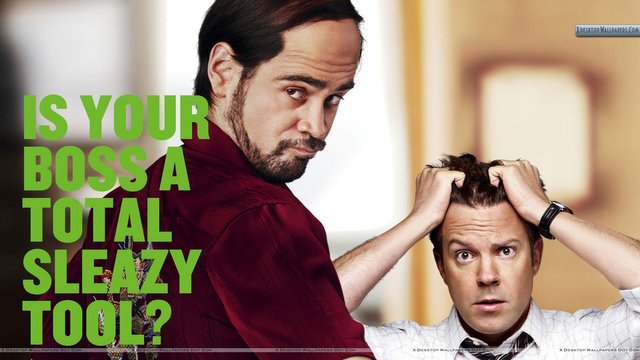
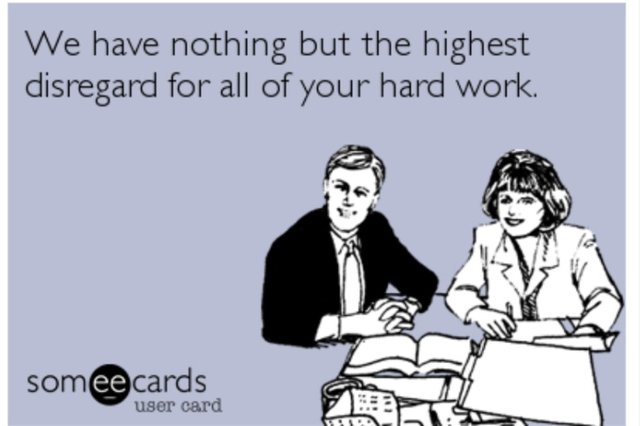
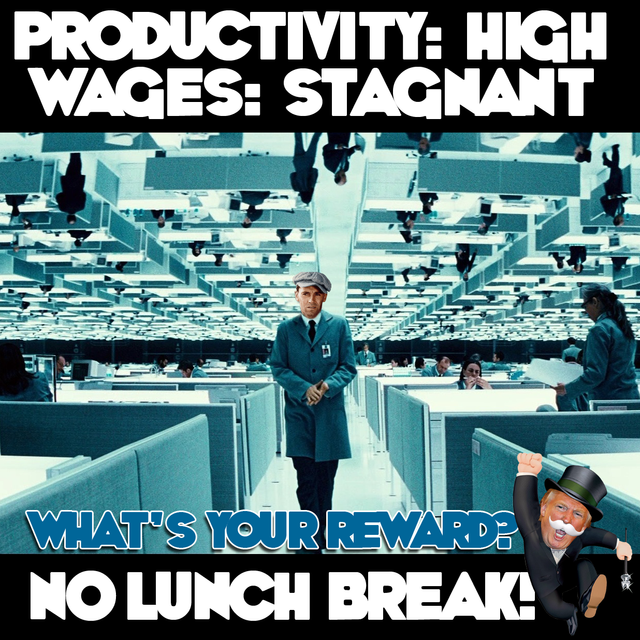

(Images from here, here, here and here.)
To sum up, the folks who've had to bear the brunt of accelerating economic change are folks with modest educational attainments, are not that flexible and are rule-followers.
So is it any surprise that so many of them saw their so-called real interests encapsulated by:

? (Image from here.)
But How Will This Change?
It is hard to see how. The jobs that made the working-class folks middle-class, are disappearing not primarily because of outsourcing but because of automation. As the old saying goes, you can't turn back progress. The replacement jobs up until now have been service-industry jobs, which tend to earn lower wages. Even these are beginning to become automated: witness the self-serve checkout stations and even self-serve kiosks in fast-food joints. The ATM is coming to the traditional reservoir of starter- and stopgap jobs.
The only jobs that are safe from automation in the foreseeable future are the ones held by the upper-middle class: management and professional-level high-skill work. Even the latter is being nibbled at, thanks to the use of Big Data in law and medicine.
No wonder there's more and more of a push for guaranteed-income schemes, even from folks you'd never suspect would favor it. The trend towards automation is so pervasive, it seems exhaustive.
But that seeming exhaustiveness was just as pervasive in the 1970s with regard to centralization and bigness. Back then, it was considered sound economics to conclude that the telephone company was a "natural monopoly." Anyone who claimed that competition would bring more efficiencies to phone service was written off as a romantic dreamer. Similar arguments were applied to electricity and, of course, computers. That's why movies like Rollerball were so believable.
If history has taught us anything, it's that the course of progress zags when the zig seems pervasively inevitable.

(Image from here.)
But where? As in the 1970s, it'll be underground for years before springing into sight. All I can point to at this point is an incentive: the person who finds a way to make a buck with people who have modest education, are inflexible but reliable and who thrive best in a system of fixed rules will find that (s)he will make a lot of money. Given the trend towards decentralization, this zag may well be a long-tail phenomenon with many entrepreneurs collectively making the old blue-collar crowd great again.
Thanks for reading! Am I a romantic dreamer? Let me know!

(Image from here.)
A great post.
I have a couple of counterpoints:
I enjoyed this very much and have resteemed it!
Thanks for elaborating on point I skipped over. Yes, you're right in that the political class is real and that it gums up the works. I also skipped over the effect of illegal immigration and the downsides of globalization.
However, those problems are ones that have political solutions. They can certainly be seen as symptoms of a trend that's gone too far, just as inflexible unions and go-through-the-motions management were symptomatic of the centralization/economies-of-scale trend going too far.
LOL, I was going to bring up crap like TQM and PMP and forgot it while typing out the rest.
And I bet there are additional factors we are also overlooking
Yes, true. I'd have to leave that crap-sifting to a real historian.
Excellent article...upvoted & resteemed! I had forgotten all about good old Alan Eagleson! When he burst on the scene the average salary for an upper-tier hockey player was $14,000 a year. He started representing almost all of the dominant players- Richard (who you mentioned) Bobby Orr and others. I know this isn't about hockey...I just thought I'd throw that in.
Thanks! Feel free to add anything you think is relevant. Yes, Eagleson - despite his own crooked hands - did give a huge boost to NHL salaries. So did new money in the WHA (World Hockey Association) who were glad to bid up salaries for stars like Bobby Hull.
You might as well: hard as it is to believe given the length of the OP, I actually had to excise some of it!
I wouldn't know what to add...you pretty much hit everything. I'll give it another read and think about it some. The Rollerball analogy was great! So was the Metropolis reference...What a prophetic movie. If you haven't seen this, you might check it out.
Actually, I haven't. Thanks for it.
It's a little like a mixture of Metropolis and 1984.
Okay.